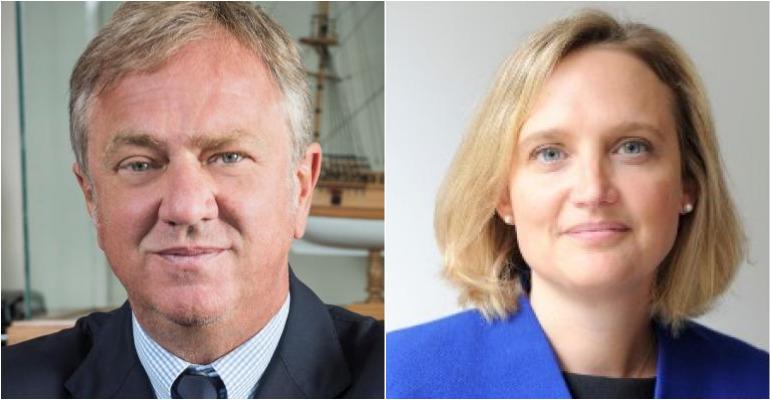Cruise industry leaders convening in Genoa at the industry's first European Summit devoted to decarbonisation of cruising called on governments to join in the effort as the EU takes critical steps to deliver on its 2030 ambitions.
Zero carbon cruising by 2050
The tone was set during the opening session at the Cruise Lines International Association European Summit as senior leaders called for the right regulatory framework and investments to match the industry's commitment to accelerate development and delivery of sustainable maritime fuels and technologies necessary to achieve net-zero carbon cruising by 2050.
Cruise lines are investing significantly in research projects and new innovative technologies aimed at improving their environmental performance. New vessels are, however, only one part of the equation, and the industry will need access to adequate infrastructure and supply of sustainable fuels to achieve their objectives.
Pierfrancesco Vago, executive chairman, MSC Cruises and global chair, CLIA said: ‘The cruise industry shares a vision with European governments of a sustainable blue economy. The industry is stepping up and can deliver on our promises. Clear support from decision makers is needed to ensure that the right infrastructure is developed and is accessible, and that the right incentives can guarantee the development and delivery of sustainable maritime solutions.'
Large-scale research requires public finance
He added, 'Cruise lines are involved in many research projects, looking at new fuel sources such as methanol, synthetic fuels, biofuels and hydrogen but much of this research is in the experimental phase. Large-scale research will require public finance. This is why we are calling for a full earmarking of revenues collected from the EU Emissions Trading System as of 2023, to be reinvested in innovation projects for our sector.’
He added that the purchase, financing and operation of cruise vessels should be considered an integral part of sustainable finance programmes, noting, ‘If governments were to choose not to support this inclusion, it would imperil shipbuilding activities in Europe and the related technology development. It would also impact thousands of jobs and risk losing Europe’s leadership in cruise ship construction.’
Marie-Caroline Laurent, CLIA’s director general in Europe, added: ‘The cruise industry has already taken firm and robust measures towards achieving its decarbonisation goals and, collectively, is committed to deliver.’
She added, ‘The cruise industry is powering European maritime industry innovation and is critical to help the EU to deliver the necessary step change towards decarbonisation. It is essential that we now need a clear legislative framework to encourage the investment and innovation that will be required for industry to achieve the 2030 EU Fit for 55 objectives and ultimately our 2050 ambitions.’
A panel of cruise lines, shipyards, manufacturers, port operators and fuel producers met to discuss potential alternative fuels and technologies on the horizon to deliver zero-emission cruising. The capacity to produce renewable marine fuels at scale remains very limited, with more focus on other transport modes.
The industry is calling for adequate incentives and support mechanisms from governments to secure the supply of future sustainable fuels the maritime sector.
Shore power
Vago said port infrastructure had been identified by CLIA as another very important area where public finance investment is essential. Cruise lines have committed to use shoreside electricity (SSE), where offered by ports, and 66% of the global fleet will be equipped to connect to SSE by 2027. Only a handful of cruise berths provide SSE in European ports, while the European Union goal is for all main ports in the continent to be equipped by 2030. 'For years we have equipped our ships to use shoreside electricity. 93% of the current order book capacity is slated to be equipped with this capability. In five years, at least two-thirds of the global cruise fleet will be equipped but only 0.6% of cruise berths in Europe are ready to provide shoreside power… It will cost an estimated 5 billion euro to equip one third of cruise ports in Europe.’
On ensuring the production of sustainable fuels, he said, ‘CLIA has recently joined the European Commission’s Low Carbon Fuels Value Chain Alliance to support efforts to boost production and supply… The maritime sector will need, according to the European Commission, around 43 mega tonnes of sustainable marine fuels by 2050 to meet our decarbonisation objectives in Europe alone.’
Laurent concluded that the industry efforts are key to its future in Europe, as the sector has a vision to become the most sustainable form of tourism, reducing emissions at sea and in ports, fully implementing the concept of circularity for waste.
Sustainable Fuel Alliance
The Summit took place as CLIA’s membership in the Sustainable Fuel Alliance was confirmed. The alliance is focused on boosting production and supply of renewable and low-carbon fuels in the aviation and waterborne sectors and brings together organisations sharing a vision for the future value chain of sustainable fuels.
Copyright © 2024. All rights reserved. Seatrade, a trading name of Informa Markets (UK) Limited.
Add Seatrade Cruise News to your Google News feed.  |

